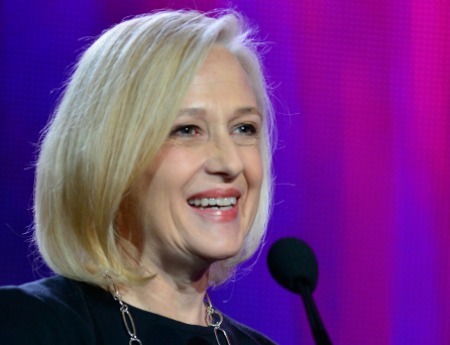PBS’ Kerger: New American Drama Series a ‘Really Big Deal’ #TCA15

The smarter way to stay on top of broadcasting and cable industry. Sign up below
You are now subscribed
Your newsletter sign-up was successful
Related: Complete Coverage of TCA Winter Press Tour
It has been 10 years since PBS last presented an original American dramatic series on its schedule. On Monday, the public broadcaster announced that it is returning to home-grown drama with an untitled Ridley Scott-produced series, created by Lisa Quijano Wolfinger and former ER showrunner David W. Zucker, set in a Civil War hospital.
“This is a really big deal for us,” Paula A. Kerger, president and CEO of PBS. “We’re really excited about it and we’re delighted that David and Lisa and the team that they’ve assembled around it are working with us, because we believe it’s going be an extraordinary series for public television.” The series is based on real stories taken from the memoirs and letters of doctors and nurse volunteers at a Virginia hospital.
Kerger did not address the long-term future of the public broadcaster’s highest rated program, Downton Abbey, which became the subject of speculation when NBC entertainment chairman Bob Greenblatt told reporters Friday that NBC is preparing to go into production on Downton creator Julian Fellowes’ new series The Gilded Age. “We’re planning on season six and it will be broadcast in January of next year.” Kerger said when asked whether Gilded Age would impact Downton, whose six season has already been confirmed. She did not discuss plans for additional seasons.
PBS adds to its original scripted programming slate at a time when cable networks and digital services are ramping up the number of hours of their own original scripted offerings. During her TCA winter press tour executive session Monday, Kerger was asked how PBS can differentiate itself.
“We feel that there is a unique role in telling a story that is in fact based on historic fact,” Kerger said. “These are real people, these are real experiences. From our perspective, frankly, I look at Downton Abbey in the same way, it shines a light on a part of history that I think is really interesting and engaging.” While PBS produces a significant amount of historical documentaries, some viewers are more likely to engage with history through drama. “We’re not looking to do drama for drama’s sake. We’re looking to do drama that is a little different from what everyone else is doing.”
Kerger touted increased ratings for PBS programming, claiming that viewership on Sunday nights, home to Downton Abbey and other scripted dramas, is up 7% from last season, and that Monday, Tuesday and Wednesday nights are up 4%.
The smarter way to stay on top of broadcasting and cable industry. Sign up below
The network has experimented recently with the way it offers content for digital viewing. In September, PBS made the entire run of its most recent Ken Burns documentary, The Roosevelts, available for streaming on the same day that the first episode was broadcast.
“Most people used it as a way to catch up,” Kerger said. “There’s still a lot of people that want to have a collective viewing experience.” While some viewers did binge-watch the episodes digitally, “Most people used it as a way to supplement what was also broadcast viewing.”
Kerger also said she hopes to build the broadcaster’s arts programming—a core part of its identity, but, she conceded, a challenge. She noted that ratings for Friday-night arts programming have been flat versus the previous season.
“Arts programming is very expensive to produce,” she said. “It doesn’t always bring the largest audience if you’re doing work like dance, for example.” But the broadcaster is in the process of developing a program on American music that Kerger hopes will stand out.
Like for-profit broadcasters and cable networks, PBS is placing a greater emphasis on delayed viewing, but is looking at the issue of measurement from a different perspective.
“Does it matter how many people were watching on a premiere night for a program or does it matter how many people are connecting to a program regardless of where it’s being distributed?” Kerger said. The answer, she added, is the latter. “At least from my perspective—and my economic model is different than every other person who stood up here, I recognize that—I’m more interested in making sure that if we make a really great series that it finds the people who will enjoy it or hopefully be inspired by it.”
